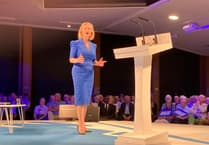Finance Ministers across the UK met in Cardiff today (Wednesday), with discussion dominated by how to support people and businesses with soaring bills.
The price of food, fuel, energy, clothes, travel costs and rent continue to go up as inflation rises. And OFGEM has warned energy bills are set to rise again by around £800 per year in October. This is against the backdrop of increasing concerns about the impact of the crisis on individuals’ health and wellbeing.
The UK’s Finance Ministers discussed what more can be done to help people cope with this crisis at a joint Committee which considers fiscal and economic matters affecting the UK. Today’s meeting was the first time the Committee met in Cardiff.
Ministers also considered concerns about EU replacement funding, as well as Covid recovery and the move towards net zero. The need to invest in renewables to ensure energy security was discussed, along with how to make sure people are able to meet the costs of their energy needs now and in the future.
Following the meeting, the Northern Irish, Scottish and Welsh Ministers visited South Point Primary School in Rhoose – Wales’ first net zero school.
Rebecca Evans, Minister for Finance and Local Government, said:
“The UK Government needs to use the levers at its disposal to take further urgent steps to target gaps in support, particularly to help lower income households and families with children, and to boost businesses who are also feeling the impacts of rising costs.
“Removing all social and environmental policy costs from household energy bills, for example, and introducing a lower price cap for lower income households, would help them to meet the costs of their energy needs now and in the future.
“Our budget is now worth at least £600m less than when we made our spending plans last year. We call on the Chancellor to increase it in line with inflation so that we can support NHS recovery following the pandemic, invest in jobs and growth, and boost our cost of living response.”
Commenting after the meeting, Finance Minister, Conor Murphy said:
“The collective message to Treasury today was clear - more must be done to help households and businesses facing an unprecedented cost of living crisis. While Treasury has announced assistance for citizens they must now look at supporting businesses which are also facing increased fuel and energy costs against a backdrop of trying to recover from the impact of the Covid-19 pandemic. Along with the Welsh and Scottish Finance Ministers I impressed upon the Chief Secretary to the Treasury the need for further measures to be taken. I once again called on Treasury to reduce VAT on energy bills.
“I also reiterated to the Chief Secretary to the Treasury the need to ensure the citizens of the North are not disadvantaged when it comes to the £400 Energy Bill Support Scheme payment because of the absence of an Executive. We have committed to continue the engagement between my Department and Treasury to ensure a solution is found to deliver support locally.”
Cabinet Secretary for Finance & Economy Kate Forbes said:
“As we continue our economic recovery from the pandemic and the ongoing cost of living crisis, we must firmly focus government and public sector resources on delivering clear priorities, including tackling child poverty, growing the economy and meeting our climate change targets.
“According to the Scottish Fiscal Commission (SFC), the overall Scottish Budget fell by 5.2% in real terms between 2021-22 and 2022-23 with a further 1% real-terms reduction forecast sustained until 2025-26.
“While we are doing all we can with the finite financial resources and limited powers currently available to us to tackle the rising cost of living, the UK Government needs to use the powers at their disposal to help those most in need, including those from low income households and families with children as well as businesses.”




